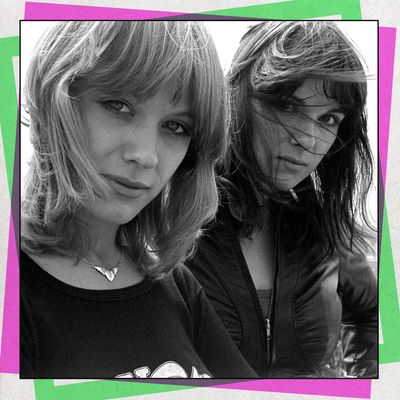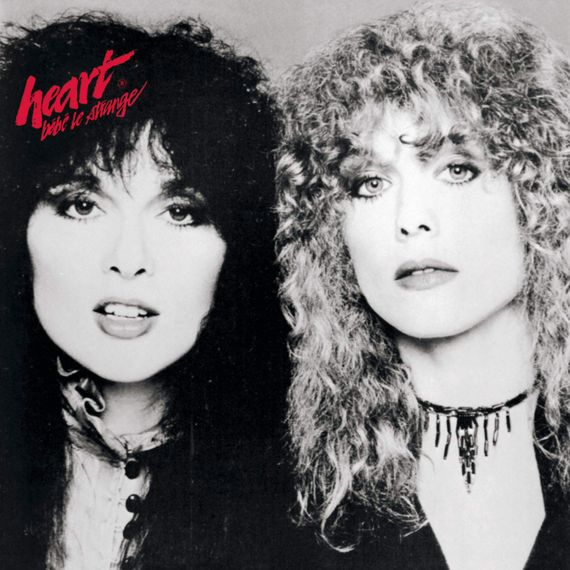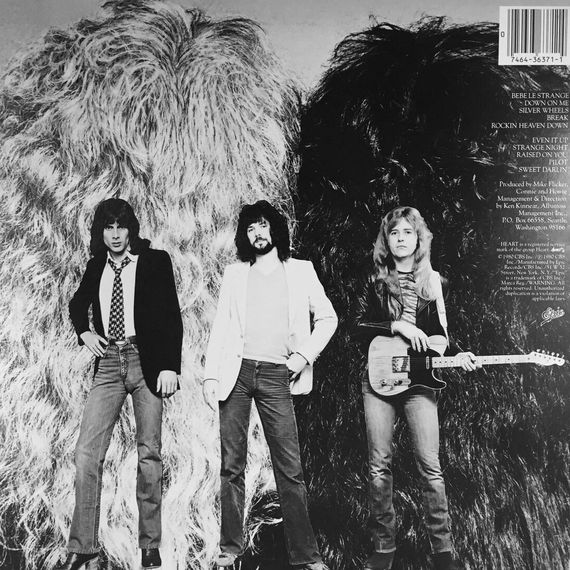
Heart, fronted by the bewitchingly powerful sisters Nancy and Ann Wilson, ascended during an era where women were still outliers in rock — and sure as hell weren’t expected to be leading their own band. “There were mainly four jobs for us to choose from then,” Nancy explained at the band’s 2013 Rock & Roll Hall of Fame induction. “Teachers, mothers, nurses, or waitresses.” But the industry’s sexism wound up being an irreverent source of inspiration for the Wilsons, with some of Heart’s best-known songs serving as a big, threatening fuck-you to the men lurking in the studio shadows. (With other hits, of course, celebrating the complex art of female desire.) Beginning with 1975’s Dreamboat Annie, crescendoing with 1977’s Little Queen, and skillfully reinventing themselves with 1985’s Heart, the band not only proved that hard- and glam-infused rock had a place for mainstream stardom, but that the success could be accomplished with women — gloriously permed and eyeshadowed — at the helm.
Nancy, the band’s guitarist, backing vocalist, and frequent songwriter, is now embarking on a new musical journey: On May 7, she’ll release her very first solo album, You and Me, which she wrote during her pandemic quarantine. During a recent conversation, she walked us through what she considers to be the best, most underrated, and ballsiest of Heart’s history.
Best Heart song
That’s a tough question. There’s a few songs that I think are Heart’s best songs, but if I had to narrow it all the way down to one, I think there’s a special iconography about “Mistral Wind.” It really paints the whole picture of what Heart’s capable of doing, because there’s storytelling and poetry to it. There’s a sweeping philosophical symbolism to it. It’s also got this dissonance of a guitar intro, which gives way to a big storm that sweeps you through the song and leaves you out the other side of the song as if your life has changed. I realize that’s a lot of highfalutin imagery, but I do think that’s what the song achieves. [Laughs.] It’s a Ulysses-type song. It describes the journey of waiting for the wind to kick up in your life, and then it does, and then it takes you on more of a wild ride than you ever expected to be on — a life-threatening wild ride. And you’re a changed person forever. You’ll never look at life the same way again. “Mistral Wind” represents all cylinders of Heart. We’ve always tried to be heavier and more poetic and life-affirming. Maybe even bird’s-eye-view in certain ways, not just on the ground singing about boyfriend-girlfriend stuff. That’s never been our forte.
Song that reminds you most of your sister, Ann
Ann came up with those words to “Dog & Butterfly,” and it really represents her curiosity with all things spiritual — in the Yoda sort of way. She’s always had this propensity, I guess, to look for the wise old man or the wisdom of the elderly man. A humanitarian spiritual guide in your life. I think that’s exactly who Ann was and still is. “Dog & Butterfly” has a lovely structure, and having composed the music to it, it really spoke to a lot of people. Over the years as we played the song live, people have always told us things like, “Oh, I cry when I hear this song every time, but what does it mean?” [Laughs.] It’s got a beautiful, romantic, spiritual statement to it. Ann’s taken to the idea that it’s a song about if you keep trying for your dream, don’t stop trying. You might be the dog trying to catch a butterfly, and you have to keep trying even if you don’t catch it. It narrows it down into an understandable context. But I love that people like to say, “I love that song even if I don’t know why!”
Song that carries the worst memories
This sounds weird to say, but it has to be “All I Wanna Do Is Make Love to You.” It was a Robert Lange song, and he had a lot of big hits with Def Leppard and Shania Twain. He’s a huge hitmaker. We were in the position in that part of the ’80s where all of the wrong bands were almost being forced to hire outsider songwriters from the Los Angeles songwriting stable, so they could have bigger hits and make more corporate money. It was a clumsy time for us as artists and creatives. With that song we were like, Okay, if we’re gonna record this song, we have to change it from a country-story type of song and make it a rock song. It definitely had a catchy chorus and it takes the listeners on a journey, but it wasn’t stuff that we would want to write ourselves. So we changed the gender of the song because it had been written for a man, and we made it our own gender. And what do you know? It became our biggest worldwide hit. It was banned in Ireland. We were like, hey, that’s pretty cool. It almost makes it more of a rock song when that happens. Let’s just say the shoe fit, but not comfortably.
Song whose meaning has changed the most for you
“Magic Man” has been a song that we played, retired for a while, played again, and then retired again, and so on. We’d try to add new parts or update things inside the song through the years. Because although it’s a pretty universal story about a lot of young women — being seduced by older guys — Ann goes off and on about feeling good singing it. “Magic Man” represents part of her own life that she wrote about when she was closer to a teenager. As a singer, it doesn’t come as easily to her as it would’ve when she was closer to the age she had written it. She feels different now about that guy it was written about. And there’s another guy now, but it’s not about him. He’s the magic man, but what guy are you talking about? She’s had to update the song in a few different ways as we’ve played it through the years. I’ve always admired Ann for that — that aspect of wanting to be all the way in a song before she delivers it. She has to deliver the song in an honest voice and not be phoning it in. That’s her quandary and that’s a really admirable thing about her.
Most underrated song
There’s a couple of those, but one that I really loved and wished got more attention was “Language of Love.” It came from an album, Passionworks, that I felt was badly produced overall [by Keith Olsen]. But that song had a wonderful, poetic structure to it. It was put on the B-list of Heart songs in the end. Funny enough, I ended up putting a better version of “Language of Love” on our Beautiful Broken album. I redid a couple of songs that I wished would be bigger hits, so at least it got a second life.
Most Zeppelin-inspired guitar work
The first one that comes to mind is “Mistral Wind” again. That’s got the dissonance and unexpected structure between the keys of E and F. You sort of break the rules like Jimmy Page often did with his playing of his parts. You’re like, Whoa, that’s out of left field. We also did a song called “Heaven” live at the Royal Albert Hall. It has me seated on a mushroom with a cello bow, open tuning to a song that’s almost like a “Kashmir.” That’s something Jimmy would do, and that was out of the box. On the acoustic side of things, I can think of a few things from The Road Home. We worked with John Paul Jones on that album. The title track had a really cool acoustic bit that runs through the song, which struck me as very Zeppelin.
Guitar solo that’ll always make your fingers hurt
“The Road Home” is a hard song for me to pull off. It’s a fast and finger-style song; there’s a lot of sliding around to do. I don’t play acoustic guitar lightly — I play it like a percussion instrument. All those things combined make that one a real tough one for me. I have to warm up a lot before I tackle it.
Acoustic-guitar moment that makes you feel most powerful
The intro to “Crazy on You,” which I named “Silver Wheels.” The big riff that comes in and the kick combined — it’s hard to beat that moment. It’s such an intricate intro followed by the release of the beginning of the song. It sets you off on a charging stead and it’s always a big moment. Having been a club and cabaret band for so long, we played a lot of Yes songs with acoustic intros that were crafted by Steve Howe. I mean, he’s the guitar player for Yes, so he’s no slouch. [Laughs.] So we thought we wanted Dreamboat Annie to be a concept album where we would have a recurring motif throughout, or string melodies and arrangements throughout. We had lofty ideas of what we wanted to do. So in Steve’s fashion, I tried to invent a perfect instrument introduction for “Crazy on You.” I modeled it after the song “Angie,” by Simon & Garfunkel, which is an incredible instrumental work. So I sat down for a couple days and came up with “Silver Wheels.” And it worked!
Ballsiest lyrics
“Barracuda” is a scathing attack on the slimeballs, plural. It’s the person who represents that slimeball in the industry, who comes up and tries to fit you into a very small box as a woman with sexuality and objectification — all those slimeball things that they can force-feed you that we weren’t ready to be categorized as. We weren’t going into that box. Somebody within the industry said to Ann, “Oh, you and your lover Nancy, right?” Ann was so indignant. Hell, her boyfriend was right over there in the same room. It was such an insult because we were there for the art. We weren’t there for the salacious slimeball mentality of the industry. She wrote the words to “Barracuda” that night in a hotel room and then we put it together really fast. The song represents the power of a couple marine-corps brats. [Laughs.] You don’t want to see that war face.
Most sexist review
One of our very first reviews from a show we did in Vancouver said something along the lines of, “Ann Wilson, whose voice could push the foghorn industry on hold.” It was scathing because our band featured a “loud woman.” It was a loud, uppity woman on a big stage with a loud voice. It’s like, what? There’s no room for a woman to have power? That was, I think, the most insulting — and laughably so — review ever. I’d put it in a frame now if I could find it.
Most meaningful compliment you’ve received from another guitarist
There are two important ones. The first occurred after we performed “Stairway to Heaven” at the Kennedy Center Honors in 2012. Led Zeppelin was there as honorees, of course, in the balcony. We were invited to the dinner, and Jimmy Page himself said how great I could play. They all walked up to our table to personally thank us. But Jimmy said, “You played that great. You really nailed it.” Coming from him I thought, Oh my God, I could die now. I’m a Zeppelin superfan! But also, we didn’t see the way they reacted to the performance until after it was edited and aired, because we couldn’t see up to the balcony while we were doing it. I think a lot of that reaction was relief, for one thing, because we didn’t screw it up. Having Jason Bonham, the son of John Bonham, playing on the drums added to their big emotional wallop. It was a surprise for them; they had no idea.
The other one was Eddie Van Halen. We were on a festival tour with them in the late ’70s and we hung out a bit. He told me, “Your acoustic playing is so good.” I was like, “Oh my God, I can’t even hear that, but thank you.” I asked him why he’s never played acoustic guitar, and he said he didn’t have one. So I said, “Well, here’s one right now, take mine as a gift.” He played around with it all night, and called me on the hotel at the break of dawn the next day to play me a beautiful piece. I loved it so much. On my new album, I dedicated a song called “4 Edward” to him because of that experience.
Favorite sister album cover


I like the Bébé le Strange cover the best. We were old enough to not have a whole band shot, which didn’t go over well with the guys. I loved that it was a close-up of both of us in black-and-white. The looks on our faces are self-satisfied in a cool way. We look like cool rockers. [Laughs.] When you turn the cover over, you see the back of our permed hair, and the other guys in the band are in our hair, literally and figuratively. They didn’t like that part at all. But I always loved that cover despite the fact they were so disgruntled being on the back in our hair.
More From The Superlatives Series
- Hans Zimmer on His Most Unusual and Underrated Scores
- The Coolest and Craziest of TLC, According to Chilli
- Kim Deal on Her Coolest and Most Vulnerable Music


